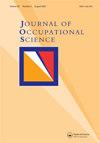疫情期间的监禁:扩大职业剥夺概念范围的催化剂
IF 2.4
Q1 SOCIAL SCIENCES, INTERDISCIPLINARY
引用次数: 1
摘要
先前的职业科学和职业治疗文献已经将职业剥夺的后果与其长期健康和社会影响联系起来;然而,新冠肺炎大流行揭示了职业剥夺的迅速和危及生命的影响,以及使其对边缘化人口长期存在的结构性因素。在这篇讨论论文中,我们展示了围绕职业剥夺的监狱故意设计如何使被监禁的人在新冠肺炎大流行期间特别容易受到感染。我们认为,旨在控制疾病传播的公共卫生建议与监狱结构相冲突,这些建议要求人们适应自己的职业并从事健康保护职业。在此基础上,我们建议有必要更广泛地了解职业剥夺及其可能产生的危及生命的影响。我们进一步主张扩大现有的概念,以考虑职业剥夺后果的直接性。我们建议,这种更全面的理解将为旨在进行结构改革的宣传工作提供更坚实的基础和更大的紧迫性。本文章由计算机程序翻译,如有差异,请以英文原文为准。
Incarceration during a pandemic: A catalyst for extending the conceptual terrain of occupational deprivation
ABSTRACT Previous occupational science and occupational therapy literature has framed the consequences of occupational deprivation in relation to its long-term health and societal effects; however, the COVID-19 pandemic has illuminated the swift and life-threatening repercussions of occupational deprivation and the structural factors that perpetuate it for marginalized populations. In this discussion paper, we show how the intentional design of prisons around occupational deprivation has made incarcerated individuals particularly vulnerable to infection during the COVID-19 pandemic. We argue that public health recommendations designed to control the spread of disease, which require people to adapt their occupations and engage in health preserving occupations, conflict with the structure of prisons. On that basis, we propose the need for a broader understanding of occupational deprivation and the life-threatening effects it can have. We further argue for an expansion of existing conceptualizations to consider the immediacy of the consequences of occupational deprivation. We suggest that this more comprehensive understanding will provide a stronger foundation and greater urgency for advocacy efforts aimed at making structural changes.
求助全文
通过发布文献求助,成功后即可免费获取论文全文。
去求助
来源期刊

Journal of Occupational Science
SOCIAL SCIENCES, INTERDISCIPLINARY-
CiteScore
4.30
自引率
41.70%
发文量
46
 求助内容:
求助内容: 应助结果提醒方式:
应助结果提醒方式:


